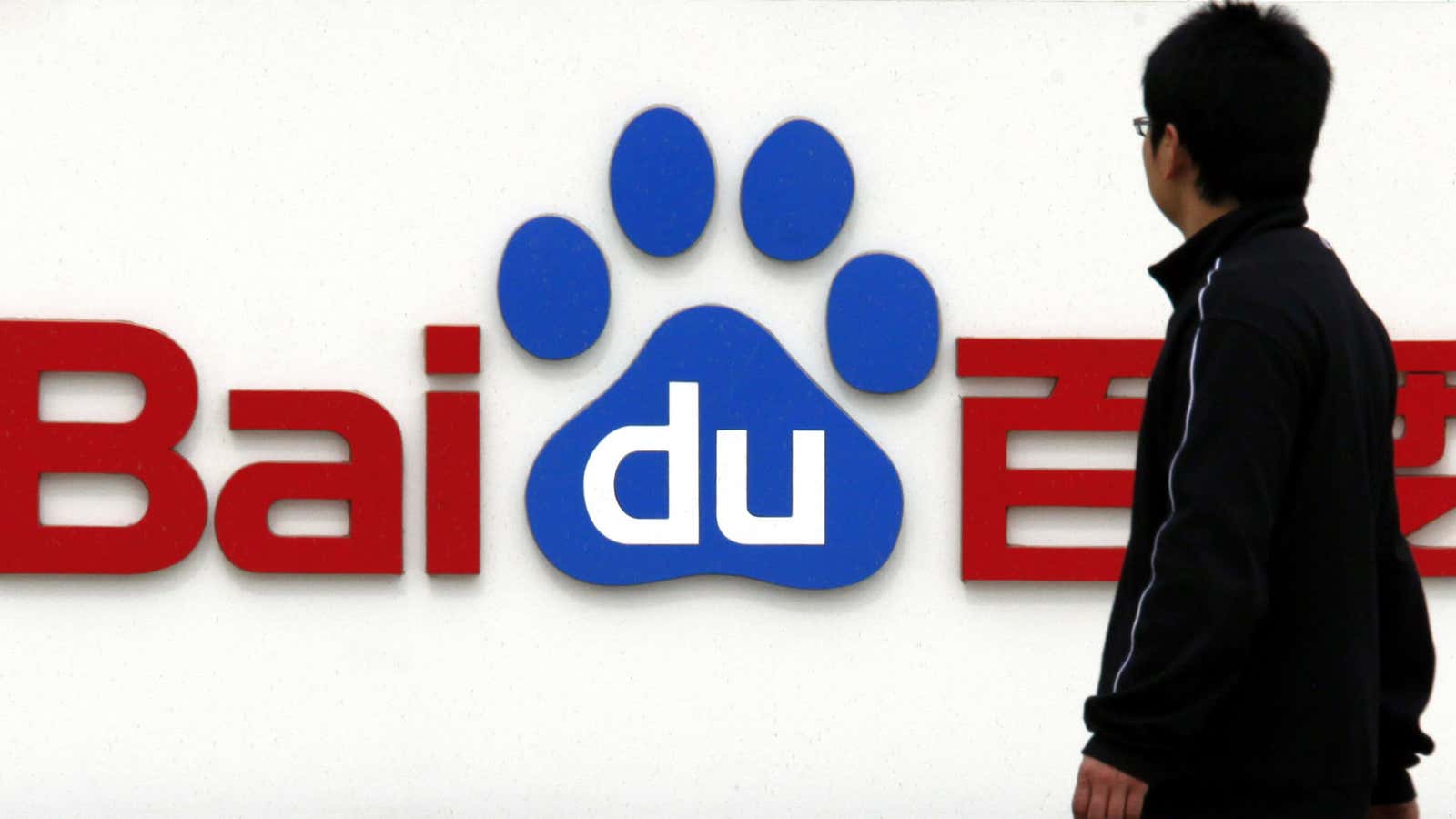This article has been corrected and updated.
Google’s search engine has been blocked almost continuously in China since late May, leaving the country’s internet users with no choice but to rely on another alternative. Even before the blockage, the country’s dominant search engine has been the homegrown tech firm Baidu, which boasts that more than 90% of Chinese internet users use its service each month.
But despite Baidu’s ubiquity, many users are finding it to be a poor replacement—especially students, academics, researchers, and technicians who need to rapidly find reliable information online. Their frustrations underline how China’s Great Firewall—the ubiquitous system of government and private-sector censorship that blocks many foreign services (like Google search) and restricts domestic ones—can be a drag on productivity in China.
Baidu, whose name represents the “search for the ideal,” may be fine for finding everyday information such as local train tickets and weather. But users in online forums complain that for in-depth research or finding more esoteric information, Baidu is often awful. While users in China can, and do, regularly use VPNs to log in to Google and other blocked sites, they are are often slow and unreliable, and not allowed in many workplace or academic settings.
Here’s what some users have to say about the search engine on the microblog service Weibo (links in Chinese, registration required):
- Lawyer Duan Wanjin: ”Once Google is unblocked, I would stop using Baidu. Its results suck.”
- Bilingbling Cat: “When I was using Google, I could find what I wanted on the first result page most of the time. But Baidu’s first page is filled with ads”
- Taotaobeipei: “I never use Baidu to search for professional information.”
Baidu is a financial success. The company’s revenues increased 58.5% in the second quarter of 2014, to $1.9 billion, and net income was up 34.1%. The company’s stock has climbed 60% in the past year on Nasdaq. But users complaints show the limitations of Baidu’s business model, at least when it comes to providing the average Chinese citizen with useful and accurate information from the internet.
Yes, Baidu censors its results carefully to follow Chinese government guidelines, not just for Chinese internet users but for anyone using its Chinese-language search engine around the world—but Chinese internet users expect that. Their frustrations go far beyond that fact.
A limited reach beyond the Chinese border
Google famously strives to “organize the world’s information and make it universally accessible and useful.” Baidu, on the other hand, sets its sights considerably lower. The company’s mission is to “provide the best and most equitable way for people to find what they are looking for,” rather than give them access to everything out there.
“It’s true that we don’t index a lot of pages that aren’t in Chinese, and that even if you search for English terms you’ll find mostly results that are relevant for Chinese users,” Kaiser Kuo, Baidu’s director for international communications, told Quartz. “The overwhelming majority of our users are in China, and most of those who aren’t in China are overseas Chinese, so it wouldn’t make sense to provide search results, even for foreign-language queries, that don’t meet the specific needs of Chinese users.”
Because Baidu originally concentrated only on Chinese language search, it is still weak at searching content in other languages. Many high quality information sources are not available in Chinese, and content from outside of mainland China, even if it is in Chinese, is not always included. This means a big gap in the overall amount of search results compared to Google.
As Lu Songsong’s Blog, a famous Chinese blog about Internet technology wrote last year, “On Google, you can see the entire World Wide Web; but on Baidu, you can just see the Chinese LAN.”
For example, a search for the phrase “hedge fund” on Google.hk, Google’s Chinese language search engine (based in Hong Kong), turns up 267 million results, including links to Bloomberg, the US Securities and Exchange Commission and Barclays.
Baidu’s search turns up just 2.48 million results, topped by people asking what the Chinese translation is for “hedge fund” in Zhidao, Baidu’s version of Quora, where anyone can answer questions, followed by some English-language definitions.
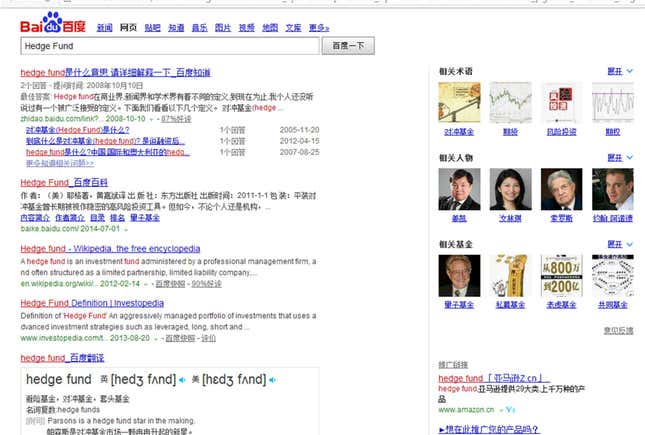
Advertising gets in the way
Lots of users find the ads on Baidu annoying, and feel users’ needs are losing out to the company’s advertising bidding system, which puts paid search listing above “organic” search results, or whatever the company’s algorithms think is the best match.
Here’s how Baidu explains its paid search results:
Each day, hundreds of thousands of people search for “cell phone” on Baidu; most wanting to buy a new cell phone. If an online cell phone shop has a good position on Baidu’s search result pages for this keyword, it may result in tens of thousands of potential customers visiting its web site. However, newer web sites need time to first get indexed, and then perhaps years to reach the top of the related search result list. To overcome this problem, Baidu offers Paid Search: Choose keywords that your potential customers may use to search your products. Your ads are then displayed at the top of those related search result lists.
Most of the world’s search biggest engines, like Google and Microsoft’s Bing, sell ads that come up in searches too, of course, they just don’t call them “Paid Search.” Like theirs, Baidu’s ad results are listed on the top of the screen, with a different background color.
Baidu said it is trying to balance interest of its online marketing customers, shareholders, and users, and is working on ways to make the advertising on Baidu more relevant and useful to our users. Still, “advertising is the business model of search engines, and we are a business,” Kuo told Quartz.
Chinese users also complain that Baidu gives preference to its own services—which, to be fair, is an allegation that Google’s competitors have also made.
For example, here’s a search for 360 Yunpan (360 网盘), a Chinese cloud storage product from the internet firm Qihoo. The first result is Baidu’s own ad promoting its similar product. (Update: The top result is clearly marked as an advertisement, Kuo said, and no different from what Google or Microsoft’s Bing would provide.)
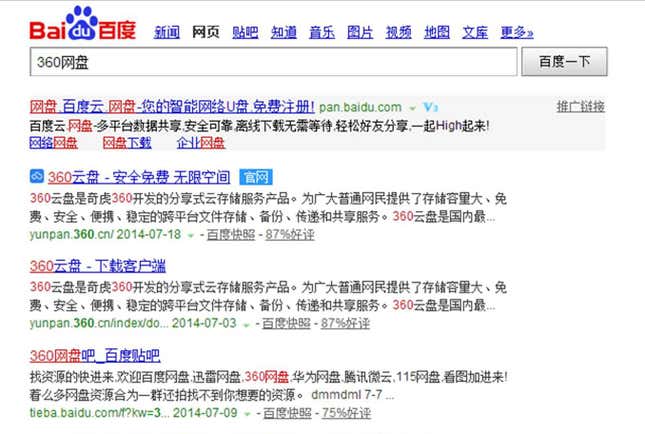
Seeking but not finding
Some of Baidu users’ complaints have nothing to do with the company’s advertising policies, its focus on results from mainland China, or even government censorship—they just can’t come up with the information they need.
Take for example Zhang Xiaogang(张晓刚), a famous contemporary Chinese painter. The first result on Google is his official website:
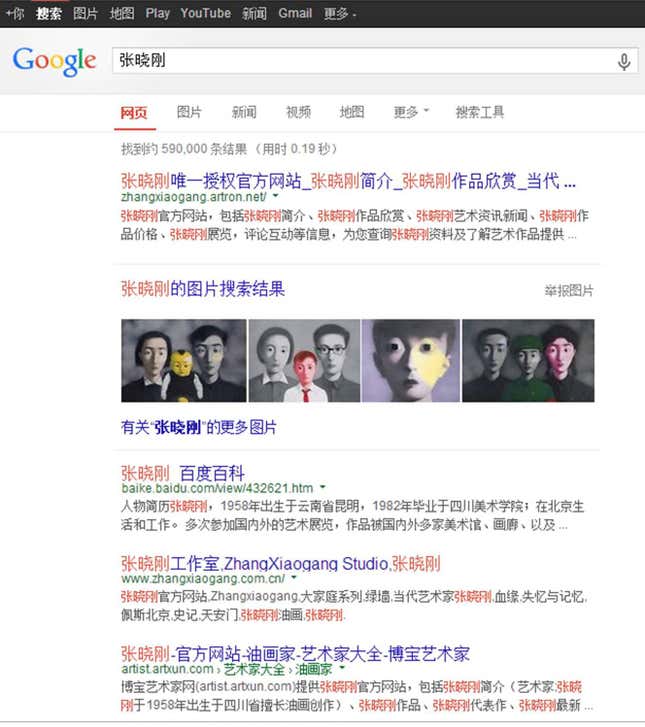
The top results on Baidu, on the other hand, are wikis and “introduction to art” websites. The painter’s official site doesn’t show up until the bottom of the first page:
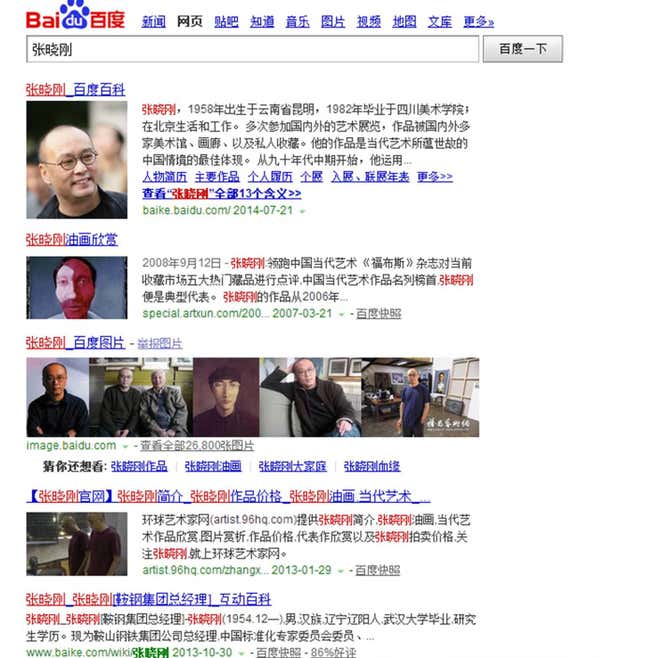
(Update: Baidu responded that it is giving the search results that most users actually want, and that the search for nearly any individual on Google turns up a Wikipedia page first. “We have a different algorithmic approach,” Kuo said. “We go through and look at what is being clicked on. What users want in China might be different from what users want outside of China.”)
Another thing that makes it hard to find the best information Baidu, users complain, is the search engine ranks popular websites higher, even though smaller and less well-known ones might have the better answers. Second-hand information published on major websites is often ranked well ahead of the original information.
That means it is hard to find the official websites of some organizations and businesses, even when you are searching for their actual names. Making matters worse, Baidu is very cautious about including newly-launched websites in its search results.
Here’s a search for Huaduoduo(花朵朵), a private online flower retailer that delivers in four of China’s biggest cities. The official website comes first on Google:
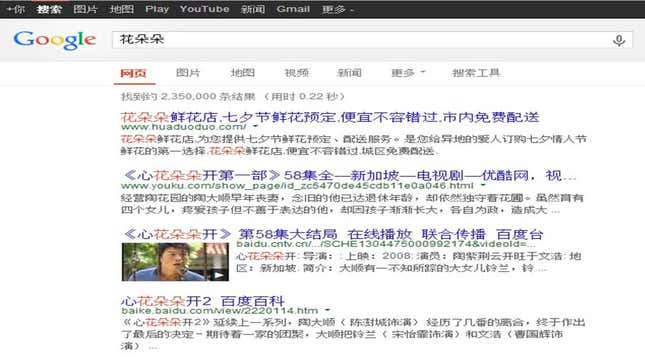
But on Baidu, most of the results refer to a famous TV show that has a similar but different name, Huaerduoduo(花儿朵朵). The flower seller’s website doesn’t even turn up on the first page:
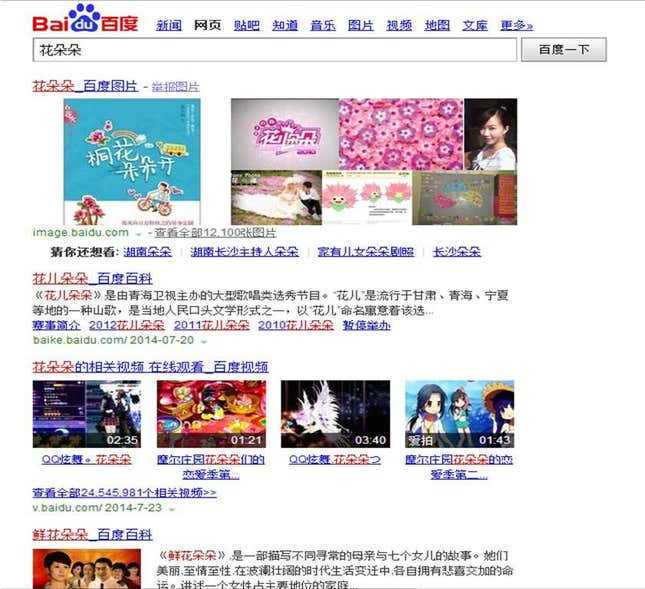
Baidu denies that its search results don’t value original content. “Our algorithm values original content more, and tries to place original source content above the innumerable cut-and-paste sites on which it also appears,” Kuo said.
(Update: The flower-seller and television show example isn’t a fair one, Baidu contends, because the names are so similar. “If you had a flower shop called ‘Sopranos,’ would you be surprised to find that Tony [Soprano] and company appeared higher than your flower shop?” on Google, Kuo said.)
The ultimate cost of censorship
While the frustration of not getting accurate and complete search results may seem like a somewhat insignificant thing in the larger context of China’s dangerous pollution and heavy-handed crackdowns on free speech, anti-censorship advocates say the long-term effects are complex and dispiriting.
“Censorship makes it harder to do simple tasks—but it’s way more complicated than that,” said Charlie Smith, the pseudonymous co-founder of the nonprofit group Greatfire, which works to subvert the Great Firewall of China. “Many students complained after Google was blocked because they could not access a lot of information that was important for their studies. The point of the censorship is to make finding information hard for people and then to frustrate them to the level where they give up.”
Cathy Sizhao Yi is on Twitter at @SizhaoY
Correction: This article originally said incorrectly that Baidu blended its organic search results with paid advertising without distinguishing between the two. The company clearly delineates between the two and puts paid advertising results above the organic results. It has also been updated to include Baidu’s response to specific search examples above. We have also slightly changed the first quote from Kaiser Kuo, after Baidu told us the original version was one that it had emailed to Quartz inadvertently and was not actually from Kuo.
